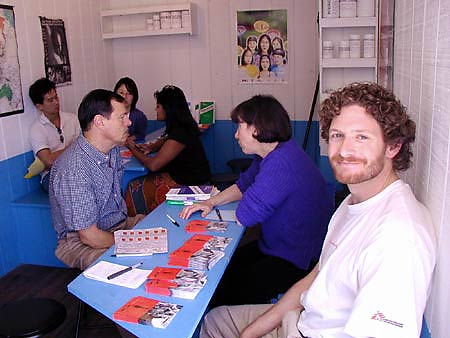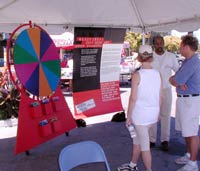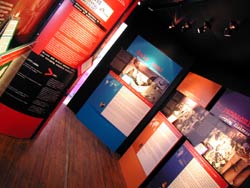|

|

|
NEWS
SEARCH
|
|
|
|

|
EXTRAS
|
|

|
 |
| Cal
alumnus Dr. Andrew Schechtman (right) and other staff doctors
consult with "patients" at the Access to Essential
Medicines EXPO. Photos by Bonnie Powell |
Doctors Without Borders exhibit makes tropical diseases
real to Americans
15 July 2002
By Bonnie Azab Powell, Public Affairs
BERKELEY
- "Got pills? Millions don't." Those four words, from
flyers announcing the 2002 Access to Essential Medicines
EXPO exhibit, cut to the heart of a crisis in international
health.
|
Access
to Essential Medicines Expo
Wed.
and Thurs.
July 17-18
10
a.m. to 6 p.m.
Springer Gateway, Oxford St. (between University
Ave. and Center St: map)
Related Events
Film Screening and Discussion:
Your Money or Your Life
Documentary on sleeping sickness and HIV/AIDS
in sub-Saharan Africa.
Wed., July 17, 7 p.m. Dwinelle Hall, Room
145
Working
in a Conflict Zone: A
Doctors Without Borders volunteer's perspective
Rose Hoban, RN
Thurs., July 18, 7:30 p.m.
International House Homeroom,
2299 Piedmont Ave. |
 |
The
exhibit transforms the distant reality of countless individuals
living without essential medicine into a personal experience.
It replaces "millions" with the faces and plights of people
suffering from five neglected but treatable diseases:
malaria, kala azar, tuberculosis, sleeping sickness and
HIV/AIDs.
Sponsored
by Doctors Without Borders, the touring exhibit will arrive
at the University of California, Berkeley, Wednesday,
July 17. See the yellow box to the right for details.
At
the exhibit, you start out by spinning the "Wheel of Misfortune"
in a tent surrounded by tsetse fly traps. A spin of the
wheel dictates your vicarious fate. If you're unlucky
enough to draw sleeping sickness (or trypanosomiasis),
you're handed a purple card that introduces you to Bianga,
a Ugandan woman who begins to feel weak shortly after
an insect bite.
You
learn that after 10 months, Bianga becomes too ill to
work in the fields or fetch water for her 6-year-old child.
As the parasite deposited by the tsetse fly makes its
way through her spinal fluid to her brain, she starts
to behave erratically and eventually lapses into a coma.
"How
lucky you are"
Inside
the 48-foot trailer for this main exhibit, photos of Bianga
and her Ugandan village are flanked by the faces of others
who drew a different fate. The gallery includes a Cambodian
woman whose strain of malaria has become resistant to
chloroquine, the most common treatment; a Georgian who
says her recurrent bouts with tuberculosis have left her
feeling "destroyed inside"; an Ethiopian man with kala
azar, a debilitating illness somewhat like malaria but
spread by the sandfly; and Roderick, a Malawi teenager
with AIDs who was lucky enough to be treated with antiretroviral
therapy free of charge.

Spinning
the Wheel of Misfortune determines which disease visitors
are assigned.
|
|
To
a background soundtrack of beating drums and children
singing, you read about the medicines currently available
to Bianga and the others.
Today, Bianga has a hope of survival. Had she been diagnosed
with sleeping sickness several years ago, she would have
had little chance of emerging from that coma. The only
medication then available for the later stage of the disease,
melarsoprol, is an arsenic derivative developed in 1949
and so lethal that it not only corrodes its plastic syringes,
but kills one in 20 patients outright. The drug eflornithine,
more effective and much less risky, was deemed unprofitable
to produce and discontinued in 1995 by its manufacturer.
When eflornithine was found to have cosmetic applications
— it helps get rid of facial hair — production
was restarted in 2001. Under pressure from Doctors Without
Borders, quantities of the drug are being made available
for treating sleeping sickness.
"Now
you know how lucky you are to live in America," a visitor
quietly admonished her two young grandchildren during
the EXPO's stop last weekend in Palo Alto.
Dr.
Andrew Schechtman, a U.C. Berkeley alumnus (Psychology/pre-med,
'89), volunteers in the exhibit's final section, in which staff
give visitors their "prognosis." Through Doctors Without Borders
(also known as Medecins Sans Frontieres), Schectman treated
patients like Bianga in northern Uganda for six months. He found
that roughly one out of five of his patients were resistant
to even the painful melarsoprol, perhaps from incomplete previous
treatments. "And yet, he says, "I
didn't have anything else to offer them."
The World Health Organization (WHO) had a small supply
of eflornithine, and Dr. Schectman would call the city
every day to see if some had arrived. "Finally I got in
enough to treat 20 patients, out of my list of 100 who
had shown resistance to the other drugs. I called back
in an 8-year-old girl ... but not a 50-year-old man who
had additional disabilities."
Despite
difficult decisions like these and a lack of resources,
Dr. Schechtman has just quit his medical practice to return
to the field, probably in Nigeria.
"Here
in the U.S., there are two or three doctors who could
easily fill my shoes," he explains. "In Uganda, I was
the only doctor for 40 miles. I was saving lives every
day. It's unquestionably the best thing I have done with
my career."
| |

The exhibit details which medicines are available
to treat five diseases, and how effective they are.
|
A
prescription for change
At
the exhibit, there are petitions to sign urging attention
to the lack of medicines, pleas that are directed to President
Bush and the pharmaceutical manufacturers. But the Access
to Essential Medicines EXPO's goal is more than just raising
public awareness of the problem. It is pushing governments,
WHO, and the drug companies to lower the prices of existing
medicines — for example, a six-to-eight-month treatment
to treat drug-resistant tuberculosis. Under pressure from
Doctors Without Borders, the price of that course has
dropped from $15,000 per patient to $3,500. Even at that
cost, it is still out of reach for most of the world's
population.
Doctors
Without Borders also wants abandoned drugs like eflornithine
brought back into production, and wants to encourage research
and development for diseases that affect only the poor.
The group's literature includes this shameful statistic:
"Of the 1,393 new chemical entities developed from 1975
to 1999, only 11 were for the tropical diseases, five
of which were the result of veterinary research."
"Our
message is not meant to inspire guilt or pity," says Brigg
Reilley, another of the EXPO's volunteer doctors. "It's
about changing the system, whether it's through technology
transfer that would enable these countries to develop
their own treatments; a tax on lifestyle drugs to help
fund research (the way cigarette taxes fund healthcare);
or using the carrot-and-stick approach, say, where pharmaceutical
companies that develop tropical-disease drugs get their
patents on others extended for a few years."
Dr.
Robert Hosang, a lecturer at the U.C. Berkeley School
of Public Health's International Health Specialty and
Interdisciplinary Studies programs, was on the committee
that pushed to bring the exhibit to campus. "Doctors Without
Borders is one of the foremost organizations working in
international public health, because they're dealing with
not just the medical issues at hand, but the political,"
Dr. Hobang explains. "Their main interest is in producing
an environment in which there's better funding of drugs,
and their focus on that issue has helped bring it forward.
This year the international community is seriously trying
to address the issue of drug availability."
Invoking
the demonstrations against apartheid that Berkeley students
launched while he was at Cal, Dr. Schechtman says, "What we
need, and what we're trying to do, is inspire a grassroots,
Berkeley-style movement. There's a lot we can change."
For
more information, drop by the Access to Essential Medicines
EXPO interactive exhibit on July 17 and 18 at Oxford Street's
Springer Gateway, or at one of its other
stops.
Doctors
Without Borders
Campaign
for Access to Essential Medicines
Online
petition for Access to Essential Medicines
|

|